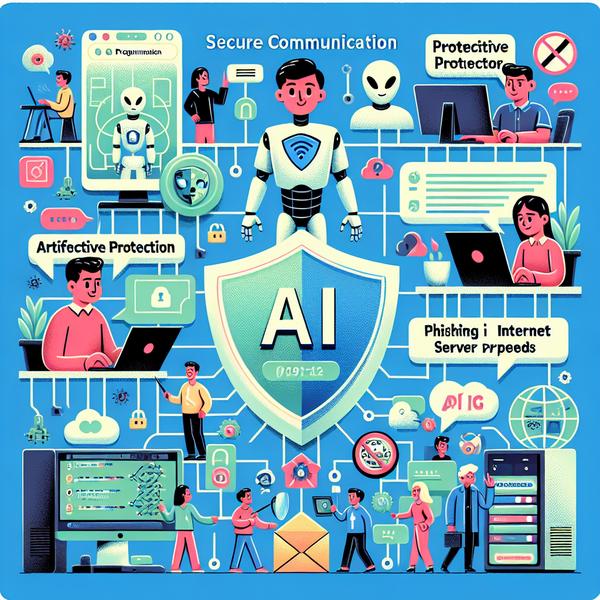
As AI takes center stage in transforming secure communication in 2025, its impact is clearly felt in VPN technologies and browsing security. With cyber threats on the rise, driven by advancements in AI and quantum computing, innovation in privacy and user trust has become the backbone of online digital safety. This era demands solutions like AI-enhanced detection of threats, quantum-resistant encryption, and decentralized systems to help users navigate a safer internet while combating the emerging challenges of privacy and ethical data use.
AI Driving the Next Wave of VPN Technology
- AI is revolutionizing VPN technology by enabling real-time threat detection. Imagine surfing the web with a shield, instantly identifying and halting any phishing attempts or malware trying to invade your private data.
- Machine learning models are now proactive protectors. They predict risks before they escalate by blocking suspicious IP addresses or redirecting traffic intelligently, much like a GPS helping you avoid heavy traffic.
- Yet, AI isn't always your friend. Criminals use generative AI to create deepfake scams and malware at alarming speeds, making it clear that AI's power is a double-edged sword.
- Customized experiences take center stage as AI allows users to optimize server speeds for gaming or streaming. It’s like having a personal internet assistant adjusting performance just for you.
- This push towards smarter, safer VPNs marks the start of an entirely new era of browsing—one where speed, security, and adaptability are driving adoption among all age groups.
Quantum-Resistant Encryption: A Game Changer
- Quantum encryption is not just a buzzword—it’s an essential innovation as quantum computers could soon crack old security methods in seconds. Companies like NordVPN lead the way, rolling out hybrid protocols that combine traditional and quantum-safe techniques.
- Think of how early adopters of seatbelts gained safety before it became mandatory. Similarly, businesses using post-quantum cryptography today are preparing for a more secure tomorrow.
- Quantum-resistant VPNs are also tackling the risk of "harvest now, decrypt later," where hackers collect secret data to misuse once better decryption tools are available. By securing data now, they nip future threats in the bud.
- Users gain peace of mind with tools fortified for evolving threats. Instead of worrying about security leaks, organizations can focus on innovation and customer trust.
- This leap into the quantum era is setting a sturdy foundation for the future of internet security—where information remains untouched, no matter how advanced the hacking strategies become.
Decentralized VPNs: An Internet without Borders
- Decentralized VPNs (dVPNs) are disrupting traditional models by using peer-to-peer networks to eliminate central points of failure. Picture a spiderweb-like network—breaking one strand doesn’t reduce the strength of the others.
- Platforms like Mysterium Network and Orchid Protocol are making waves, offering multi-hop routing where data bounces through several nodes, making tracking nearly impossible.
- Blockchain integration adds trustworthiness, giving users visibility over servers and ensuring no hidden practices like storing user data. Imagine a transparent safe where all the locks are visible and verifiable.
- However, there's a learning curve as dVPNs aren't as user-friendly yet. Higher costs and variability in performance still need ironing out before they become the go-to choice for everyday users.
- This innovation paves the way toward an internet free of geographical, political, or surveillance barriers, offering users unparalleled freedom and control.
Privacy Innovation: AI Meets User Trust
- As AI becomes a staple in privacy tech, breaches remain a concern. In 2024 alone, there were 233 AI-related incidents, a sharp rise of over 50%. Organizations yet fail to adopt adequate safeguards, exposing themselves to immense risks.
- The “trust gap” is widening, with 70% of global consumers admitting they have little or no confidence in companies using AI responsibly. It’s like renting a car without a seatbelt—you just don’t feel safe.
- AI-driven tools, however, are addressing this gap by giving users more control. Personalized privacy recommendations allow users to tailor their browsing experience, flagging malicious apps and even providing warning signals for unsecured connections.
- Adopting AI can feel empowering—like refining your home security setup, with cameras and motion detectors that automatically adjust as threats approach.
- By bridging the divide between policy and user trust, companies can position themselves as ethical leaders in AI privacy innovation.
The Regulatory Landscape: Adapting to the AI Era
- Governments globally are tightening regulations on AI usage, emphasizing stricter penalties for violations of privacy. This move aims to give users greater confidence in their online interactions.
- Corporations also face societal pressure to meet higher privacy standards. A whopping 91% of companies acknowledge they need to do more to reassure customers.
- For example, the European Union’s GDPR influences organizations worldwide to better protect user data, showing how regulations lead to ethical alignment.
- New tech like smart consent tools ensures users understand how their data is used, marking a step forward in empowering digital citizens.
- Going forward, these legal and ethical barriers will ensure that AI-powered solutions remain transparent, respectful, and user-oriented.
Conclusion
In 2025, AI and VPN technologies are more interconnected than ever. With features like quantum encryption, decentralized systems, and real-time AI insights, organizations and individuals now have robust options to fight modern cybercrime. However, challenges remain, from gaining user trust to navigating complex regulations. The future belongs to innovators who act responsibly, shaping a secure, privacy-first digital era where security isn't just a feature but a foundation of trust and freedom.